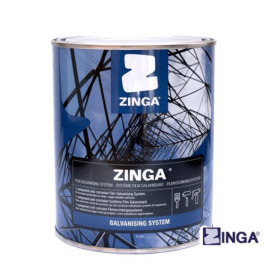
Curated with aloha by
Ted Mooney, P.E. RET

The authoritative public forum
for Metal Finishing 1989-2025

-----
Painting cast iron fountains, Restoring rusty fountains
Rusted connecting pipes in a multi- tiered fountain
Q. My four tier fountain has pipe with male and female ends that screw each basin and support level together. The ends have rusted, and some are so deteriorated that the connection can't screw on anymore. Is there a way to fix or put in new male and female ends and still be able to run a water hose to the top of the fountain?
M Platt- Moore, Idaho
June 8, 2023
Tip: This forum was established to build camaraderie among enthusiasts through sharing tips, opinions, pics & personality.
The curator & some readers who publicly share their info will be less likely to engage with those who don't.
A. Try 2-part epoxy glue ⇦ this on eBay or Amazon [affil links] . Some iron dust ⇦ this on eBay or Amazon [affil links] mixed with water glass ⇦ this on eBay or Amazon [affil links] can be helpful too. Hope it helps and good luck!
Goran Budija- Cerovski vrh Croatia
June 17, 2023
Q. Dear Rick Simpson,
Will like to know your opinion about the use of enamel prime and gloss or satin painting in a smaller public fountain, in my city where it rains frequently and there is high humidity and traffic pollution.
Is enamel a good solution, with repainting every 5 to 10 years?
Better to use brush or spray for painting.
Will appreciate your expert opinion. Thank you.
- Macau, China
November 10, 2023
⇩ Related postings, oldest first ⇩
Q. I am a gardening enthusiast who has obtained a metal fountain. Every bit of the fountain is covered in rust. It appears to have never been sealed or painted. I hope to restore it with a painted finish and bring it into full working condition including a water pump to project water. How do I begin to tackle this problem?
Leonard Strejchobbyist - Lombard, Illinois
2003
A. The best thing to do is have it sand blasted, Then a heavy primer ⇦ this on eBay or Amazon [affil links] . Paint it right after it's blasted; it will rust up on you real quick.
Jon Diamondsilver plater - Berkeley, California
A. Another alternative is as follows. Use a hand or power wire brush to remove the loose rust. Check for a rust converter ⇦ this on eBay or Amazon [affil links] (spray or brush type). Coat according to instructions on the converter and then paint with an appropriate top coat. This stuff works very well and actually turns the rust into an oxide that seals the metal surface from further rusting. Not very expensive either. I use the Mar-Hyde brand and have excellent results. Hope this helps.
Bill Miller- Shinnston, West Virginia
Waterproof coating for steel columns partially submerged in outdoor water fountain
Q. I am a General Contractor, we built an outdoor bi-level water fountain in an upscale restaurant. We have three 5" square steel columns that sit inside the upper level of the fountain, they hold up wood beams above the outdoor dinning. We painted these three columns with two coats of an industrial grade paint for metal, with metal primer. But rust spots have formed on the side/portion of each column that are continually submerged in the fountain water. I have been researching the best metal coatings (polyurethane, epoxy, etc) But not sure what to use. We plan to drain the fountain, remove the paint and install a coating that will prevent the corrosion. The fountain walls and floors are poured in place concrete, also floors have pool grade plaster installed up to and around columns.
So column base plates are encased in concrete and not in direct contact with the fountain water. Only about 2 foot of each column is actually in the water. Need help.

- Ft. Worth, Texas
2006
A. Try cathodic protection. Good luck and hope it helps!
Goran Budija- Cerovski vrh Croatia
Regards,

Ted Mooney, P.E.
Striving to live Aloha
finishing.com - Pine Beach, New Jersey
A. First, no coating is going to be absolutely foolproof, because humans apply it. No disrespect intended. My choice would be a fiberglass resin, with no mat. One with a white tint White Epoxy Resin [affil links] should work well, based on your pictures. I would use two or preferably 3 coats, with the last one containing wax ⇦ this on eBay or Amazon [affil links] . Good fiberglass sources can easily set you up with this. Wearing an activated carbon respirator ⇦ this on eBay or Amazon [affil links] would be a good idea also.
James Watts- Navarre, Florida
A. I install steel cisterns for rainwater catchment. We use a product called 'Blue Max' by Ames Research ⇨
It is really easy to use and we've had great results. We've been using it for at least 2 years now and have not had any leaking systems.
- Tucson, Arizona, USA
August 25, 2011
A. I am in the coatings business. A product that will fix your problem is Vortex Applied Coatings.
Danny Hanley- Hull, Georgia, USA
A. I am also looking for a finish to stand the elements. This company claims to have a product specifically for fountains called Permalac 2k
Shamus Quinly- Kansas City, Missouri USA
February 17, 2015
Multiple threads merged: please forgive chronology errors and repetition 🙂
Paint recommendation to refinish Antique Cast Iron Water Fountain?
Q. I need to refinish a large/heavy Antique Cast Iron Water Fountain. What would be the best product to use. It will hold water and birds and animals will probably bathe in it and folks may want to stick their feet in it. Please any help would be appreciated.
Jay Hineshobbyist - Austin, Texas, USA
October 6, 2008
A. Try Hammerite paints -- special paints for iron (modified silane based, www.hammerite.com/). Hope it helps and good luck!
Goran Budija- Cerovski vrh Croatia
October 20, 2008
Multiple threads merged: please forgive chronology errors and repetition 🙂
How do I restore a Cast Iron Antique fountain?
Q. I have an 1865 original cast iron fountain that needs restoration. Could use your advice on this.
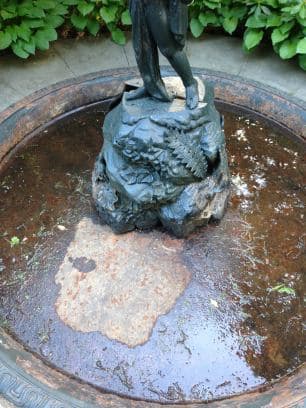
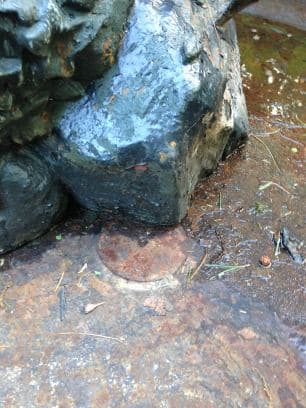
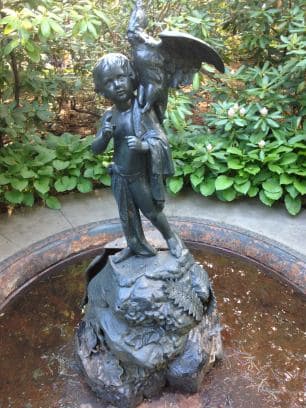
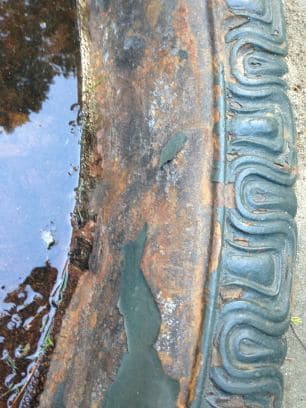
It would be SUBMERGED in water year-round. It's not removable. Its basin is rusted on the surface. It would, of course, not require any high temperature paint. Would you recommend that I use grinders like your video shows [ed. note: we don't know what thread you are referring to], but use some sort of epoxy paint as a base to coat the entire base, then paint with regular waterproof exterior paint? Appreciate the advice.
Andrew McKee- Arlington, Massachusetts
May 25, 2014
A. Hi Andrew. I think the epoxy primer would be okay, as would fiberglass products whether epoxy or polyester based, as would the proprietary products mentioned -- but I agree with Goran's earlier posting, and feel that magnesium anodes are a big part of the right answer.
I think you would find sand blasting much faster and easier than grinding. Good luck.
Regards,

Ted Mooney, P.E.
Striving to live Aloha
finishing.com - Pine Beach, New Jersey
A. Electrolysis. Followed by drying completely and rubbing bees wax
⇦ this on
eBay
or
Amazon [affil links]
into the metal. It will turn a beautiful slightly glossy black.
I think you could submerge the whole thing by building a wooden tank around it somehow.
--Not an Expert.
- Austin, Texas, USA
Artist made me a steel fountain and it's rusting away
Q. I have been on the internet trying to find a solution to a rusting problem and came across your company.
I'm wondering if anyone on this forum can take a second to offer me some advice. From the pictures you can see how severe the problem is. I had an artist make me a wall fountain. I picked out the tile for the area where the water runs down. The artist used steel for the fountain. It was very expensive ($2,300!) and it took a lot of savings on my part to have this piece made.
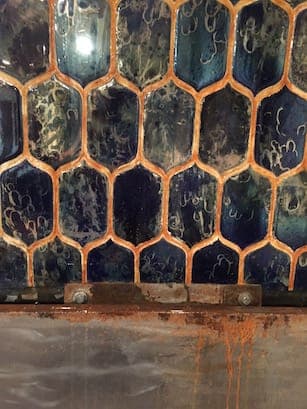
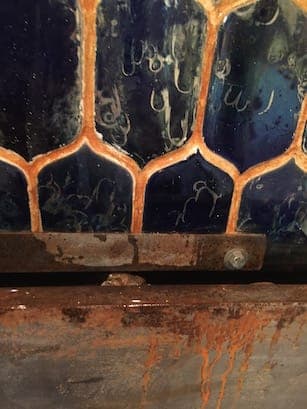
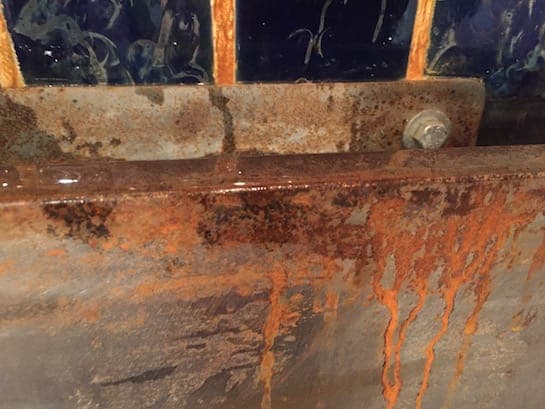
The problem? It is rusting away to nothing. I've only had it a couple of months! The steel is all pitted and and streaked with orange rust. The white grout turned a rusty orange. The artist said he "sealed" the raw steel. It's my understanding now after researching and researching that the water fountains on the market are made out of Stainless steel so they don't rust. I'm desperate.
Christine Green- San Francisco. California. United Sates
December 20, 2016
A. Hi Christine. I can think of 3 approaches to slowing the rusting; use more than one if possible:
1. Use purer water, lower in chlorides and sulphates, and therefore less conductive. Drain the fountain, and use only distilled water or rain water in the fountain. If any fertilizer, de-icer or anything else gets in the fountain, drain it and refill.
2. Sacrificial protection. Put a few magnesium anodes
⇦ this on
eBay or
Amazon [affil links]
in the water, firmly connected to the steel that the fountain is made of. Replace the anodes periodically when they wear away. They can be in a non-visible area as long as it's always wet.
3. Coating the steel with paint to retard the rust. I don't know how this suits your aesthetic taste, but using an appropriate primer
⇦ this on
eBay or
Amazon [affil links]
, or painting after a phosphoric acid rust converter
⇦ this on
eBay
or
Amazon [affil links]
) treatment will greatly slow the corrosion.
Good luck.
Regards,

Ted Mooney, P.E. RET
Striving to live Aloha
finishing.com - Pine Beach, New Jersey
Q. Thanks for your excellent advice. Because the rust has marred the whole frame so extensively, it is no longer an art piece. I'm thinking that it would have to be dismantled and redone with stainless or something else. I could try what you say but is that going to get rid of the rust that is already there. It looks awful. I'm hoping the artist will refund my money.
Christine Green [returning]- San Francisco, California. United States
A. Hi again. Yes, rust converter ⇦ this on eBay or Amazon [affil links] and paint will get rid of the rust, but it will then be painted rather than raw metal. I don't know if that suits your wishes. And the repair will have a limited life before touchup is required; I don't know how long.
Regards,

Ted Mooney, P.E. RET
Striving to live Aloha
finishing.com - Pine Beach, New Jersey
Q. Ted,
One more question. When the fountain was created, what should the artist have used instead of raw steel. If he used raw steel, what should have been done to prevent it from rusting so badly?
I am trying to find someone who can maybe take the fountain apart and coat the steel somehow or paint it. The rust is occurring inside the fountain and it's not a place I can reach to paint.
Christine
- San Francisco, California US
A. Hi Christine. I've told you the things that I think can/should now be done, and there are 2nd, 3rd, and more opinions on this page. I am very sorry that this expensive artwork turned out so unsatisfactorily for you, and wish you the best of luck in resolving it.
-- but apologies, I'm not going to get involved in a contract dispute; and it isn't fair for me to lecture an artist with "should haves" after I have the hindsight of seeing what actually happened:-(
Regards,

Ted Mooney, P.E. RET
Striving to live Aloha
finishing.com - Pine Beach, New Jersey
|
A. Ted has posted a number of good suggestions. Here are a few more:  Tom Rochester CTO - Jackson, Michigan, USA Plating Systems & Technologies, Inc.  A. Oxalic acid
⇦ this on
eBay or
Amazon [affil links]
is commonly used to remove rust stains. Perhaps that might help.  Dave Wichern Consultant - The Bronx, New York |
Q. I'm in the process of stripping my 100+ year old fountain, then cleaning down with mineral spirits
⇦ this on
eBay
or
Amazon [affil links]
- still need more work, however, now the cleaned areas have grown some rusty areas. What real good primer should I use (one or two coats) after removing the rusted areas, and what best paint should I use? Should I use spray method or hand brush or use a marine based primer/paint?
Regards
hobbyist - East Greenwich, Rhode Island
September 20, 2021
A. When coating cast-iron fountains it is always best to first blast-clean the metalwork and then apply a coat of Zinga ⇨
which is a one-component pure zinc coating.
It will be rock hard in around one hour and will normally sit there for 30 years, because this coating literally galvanises the steelwork.
You can then seal the zinc layer with an epoxy sealer like Intergard 269
⇦ this on
eBay] and then apply your aesthetic colour-coat.
People's Park in Dublin: before and after
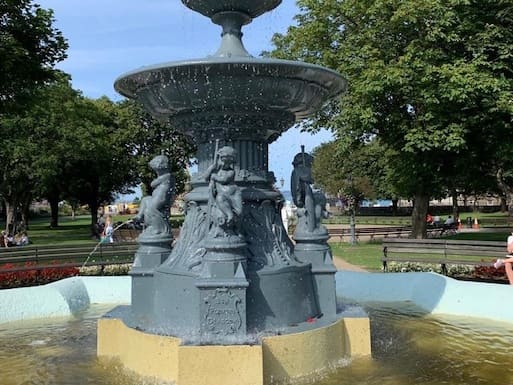
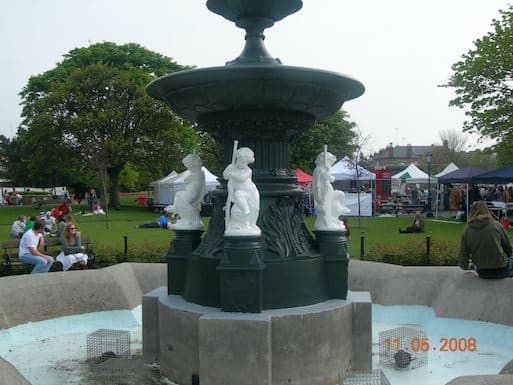
I have used this system on public fountains and always with great success, giving written guarantees for 25 years.
Rick SimpsonCoatings Consultant 47 years - England
March 9, 2022
Q. Hi,
I saw your answer to the woman with rust problems in her water fountain, and you mentioned magnesium anodes as a solution. I need to reduce the rust in my water fountain bowl. The water for it is pumped up a 30" long x 2" ID metal stem welded to the metal bowl from a plastic pail. The stem is also welded to a metal frame that fits snuggly into the pail. Where would you suggest an anode rod could be placed in this situation?
Many thanks,
- Calgary, Alberta
July 13, 2022
A. Hi John. I don't think I can answer exactly where they should go, but after we agree that they have to be constantly wet, and you don't want them where people will notice them, and they probably can't go inside the 2" dia. stem, you'll probably attach them to the metal frame.
Luck & Regards,

Ted Mooney, P.E. RET
Striving to live Aloha
finishing.com - Pine Beach, New Jersey
Q. I cut up the magnesium anode ⇦ this on eBay or Amazon [affil links] and screwed 3 pieces approx. 8" long to the frame. They are attached to the frame at the top and bottom of the rods, so two contact points per rod. Sound acceptable? (this is new to me so thought I'd better check).
John Nesbitt [returning]- Calgary Alberta
July 14, 2022
A. Hi again. I'm not really understanding that description -- a picture would probably help -- but they have to be immersed in the water; out in the air would accomplish nothing.
Luck & Regards,

Ted Mooney, P.E. RET
Striving to live Aloha
finishing.com - Pine Beach, New Jersey
Q. Hi,
Here are a couple of pictures of the fountain upside down. The circled part is the base that is under water all the time.
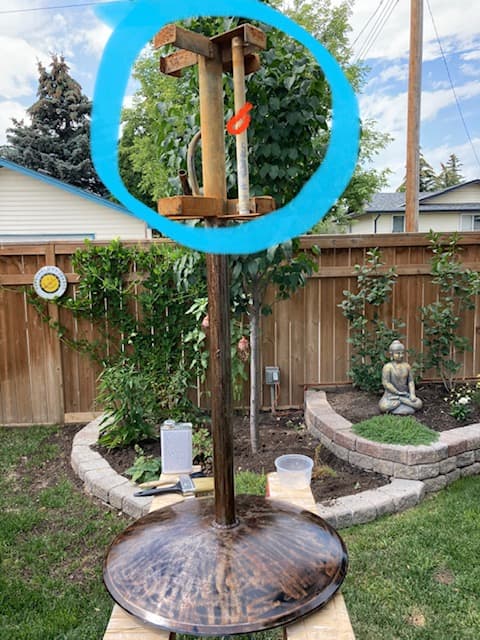
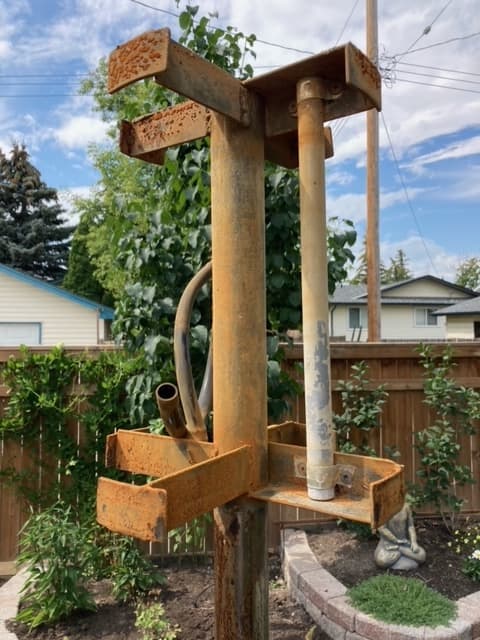
I'm currently sealing the 2" stem and the 22" bowl against rusting with Everbrite [a finishing.com supporting advertiser] but the base and the inside of the stem and will not be coated. The whole thing was as rusty as the base until I cleaned it up.
There is currently the one piece of 14" magnesium anode rod attached (red dot on it) but it's not helping that I can tell. I can add more pieces and attach them firmly to the stem and base. Will that cut down on the rusting? Any ideas would be appreciated.
- Calgary Alberta
A. Hi again,
I understand not painting the inside of the 2" dia. stem because it's difficult or impractical, but why would you not paint or at least clearcoat the base? I can't foresee clear water with that rusty base sitting in the water. Unfortunately, fresh water isn't highly conductive, which is why you need active magnesium anodes rather than zinc anodes, but I think anodes are an auxiliary method for small amounts of exposed metal in tough situations (like the inside of pipes) rather than an alternative to corrosion-proofing the base.
Luck & Regards,

Ted Mooney, P.E. RET
Striving to live Aloha
finishing.com - Pine Beach, New Jersey
Q. I've coated the base. Will the magnesium rod work better if it's fixed securely against the metal stem and the base or is it as good as it's going to get the way it is?
Thanks
- Calgary Alberta
A. Hi John. A sacrificial anode needs good metal-to-metal contact so it can conduct electricity. Other than that it's probably positioned okay. But I'd take a knife and scrape at least a little section of it to make sure it's not coated, anodized, or treated in a fashion that is limiting its ability to readily dissolve.
Luck & Regards,

Ted Mooney, P.E. RET
Striving to live Aloha
finishing.com - Pine Beach, New Jersey
Q, A, or Comment on THIS thread -or- Start a NEW Thread
